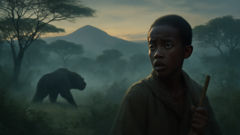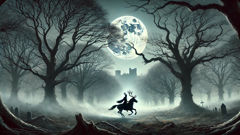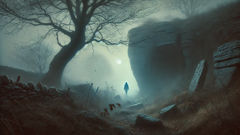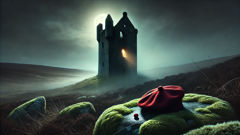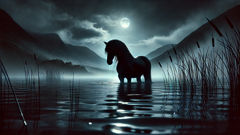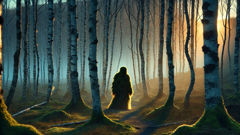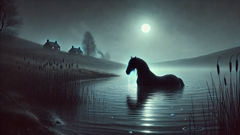Introduction
The Uasin Gishu plateau stretches under the African sky, an expanse where sunlight and shadow chase each other across golden grasslands and tangled forests. Here, the wind carries the scents of red soil, wild acacia, and the distant promise of rain. For generations, families have herded cattle across the rolling hills, their lives woven into the land as tightly as roots gripping the earth. Yet beneath the everyday rhythms of grazing, planting, and gathering around the evening fire, older stories persist—whispered on nights when the moon is thin and hyenas cackle beyond the thorny bomas. Among these tales, none is as fearsome or enduring as the legend of the Nandi Bear. Some say it’s a shaggy beast the size of a lion, with a bear’s shoulders and a hyena’s jaws, lurking where the grass grows tall and trees knot together to make impenetrable green. Others swear it walks upright, snatching cattle and people from the edges of villages, leaving only pawprints and terror behind. In this land, stories and reality blur; every snapped twig, every howl from the darkness, could signal the Nandi Bear’s return. It is here, at the edge of a forest older than memory, that a young herder named Kiprono will face a truth more haunting than any legend—and discover what it means to stand in the shadow of myth.
Whispers in the Grass
The days were long and warm on the plateau, filled with the comforting rhythm of bells and lowing cattle. Kiprono, barely sixteen but already tall for his age, moved among his father’s herd with practiced ease. He could tell by a glance which calf would stray, which bull needed calming. His hands were nimble from mending fences and coaxing milk from reluctant cows, and his skin had darkened under years of sun. To Kiprono, the land was a living thing—sometimes gentle, sometimes fierce, always demanding respect. But as the dry season deepened and the grass turned brittle, whispers grew in the village. Sheep vanished from tethering posts. Dogs refused to venture out at night, their noses quivering at scents on the wind. The elders—those who remembered the hard times and strange sightings—sat closer to the fire, their voices lowered as children eavesdropped from the shadows.
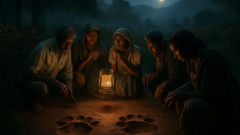
The legend of the Nandi Bear was older than any living soul. Some claimed to have glimpsed its hunched form moving through the trees—too massive for a hyena, too ferocious for a bear. Its name, Chemosit, meant ‘devourer,’ and parents invoked it to keep the boldest children from wandering after dark. Some scoffed; others crossed themselves or murmured prayers. Kiprono’s mother, Nyambura, hung a string of beads by the door, each one blessed by the village herbalist. His father, Kibet, sharpened his spear and checked the fortifications around their boma twice before sleeping.
One night, as the wind howled and thunder rumbled in the distant Cherangani Hills, Kiprono saw a strange shape moving at the edge of the thorn fence. He pressed his face to the rough wooden slats, heart pounding. It was no hyena; the creature moved with an uncanny silence, its bulk barely visible except when lightning crackled overhead. Something in the way it paused—sniffing the air, sniffing for prey—made Kiprono’s blood run cold. He barely breathed as the beast vanished into the deeper darkness.
The next morning, three goats were missing. There were tracks in the soft earth: enormous paw prints, longer than his hand and broader than any dog’s. The elders gathered to inspect them, muttering in alarm. A decision was made—no child would stray after sundown, and each family would keep watch through the night. Kiprono felt a weight settle on his shoulders. Stories he’d once dismissed as childish warnings now pressed close, as real as the cattle in his care.
For weeks, unease hung over the village like a shroud. Kiprono’s dreams grew restless. He’d wake at midnight, convinced he heard ragged breathing outside his hut or glimpsed a hulking shadow slipping between the trees. The cattle grew anxious, crowding together even during the day. The dogs, usually fierce and loyal, slunk low with their tails between their legs. One evening, as Kiprono sat with his friend Chebet beneath a fig tree, she whispered, “My grandmother says the Nandi Bear comes when people forget the old ways—when they don’t honor the land.” Chebet’s words struck Kiprono like a warning bell. Had they grown careless? Had they stopped listening to the spirits that guarded their home?
A plan formed in Kiprono’s mind. He would keep watch by himself one night, out beyond the boma, where the cattle grazed near the forest’s edge. If the Nandi Bear was more than a story, if it truly stalked their land, he would see it for himself. He would face the legend—and maybe, just maybe, he would find a way to protect his family from whatever lurked in the shadows.
A Night in the Wild
The night Kiprono chose for his vigil was cold and breathless. He wrapped himself in a faded shuka, tucking a battered torch and his father’s old spear beneath his arm. The moon was full, casting pale light across the plateau and throwing deep shadows under the tangled acacias. He settled on a rock overlooking a clearing where cattle sometimes grazed, his heart thrumming with a mixture of fear and determination.
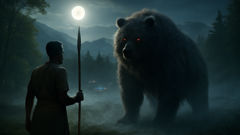
Every sound seemed magnified—the chirp of crickets, the lowing of a restless cow, the distant howl of a hyena. Kiprono tried to still his nerves, reminding himself he was the son of herders, brave as any warrior. Hours passed. The moon climbed higher, and a chilly mist crept from the forest, curling around his ankles and making the world seem both larger and lonelier. He fought sleep, pinching his arm when his eyelids drooped.
Then—a movement at the edge of vision. Kiprono froze. A shape emerged from between the trees, slow and deliberate. He could make out shaggy fur, shoulders hunched like a great bear, yet moving with a feline grace. The creature’s head was massive, with a snout like a hyena’s and eyes that glinted red in the moonlight. It paused to sniff the air, then let out a low, guttural growl that rumbled through the ground. Kiprono felt fear rise in him, cold and sharp as a knife.
He clutched his spear, willing himself not to run. The Nandi Bear advanced, stopping mere meters from Kiprono’s hiding place. They stared at each other—a boy and a legend made flesh. In that moment, Kiprono saw not just a beast but something ancient, wounded, and furious. The stories had never mentioned the sorrow in its eyes, nor the way it seemed to hesitate before moving on, as if remembering a time when humans and animals understood each other.
Kiprono’s courage broke through his terror. He stood slowly, raising his spear—not to strike, but to show he wasn’t helpless. The Nandi Bear watched, then let out a roar that echoed off the hills. Kiprono braced himself, but the beast turned away, melting into the mist and darkness as suddenly as it had come.
Shaken but alive, Kiprono staggered home at dawn. His tale was met with disbelief by some, awe by others. Chebet believed him, her eyes wide with wonder. The elders listened in silence, then called for a meeting. It was decided that the village would offer a sacrifice to the spirits of the forest, to honor the old ways and seek protection. Kiprono was hailed as brave, but he knew the truth: he had glimpsed something far older and more complicated than a monster.
Echoes of the Past
The days that followed Kiprono’s encounter were heavy with anticipation. The villagers prepared offerings: milk poured into hollowed gourds, woven baskets of millet and honey, a young goat with sleek black fur. Songs were sung in the old language, prayers carried on smoke from sacred herbs. The atmosphere was solemn but hopeful—a return to traditions nearly forgotten. Elders spoke of a time when people listened to the land and its creatures, when spirits walked openly in the world.
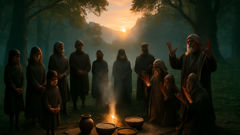
Kiprono became a reluctant celebrity. Children trailed him as he walked to fetch water, begging him to retell his story. Some parents eyed him warily, worried that he’d attracted danger. Chebet was steadfast at his side. Together, they explored the forests at midday, searching for signs—shredded bark on trees, twisted branches, more strange tracks. With every discovery, Kiprono felt a sense of connection to something larger than himself.
One afternoon, they found an old woman sitting on a fallen log, her hair white as ash and her eyes bright with secrets. She introduced herself as Mama Wambui, a keeper of stories from distant villages. She listened patiently to Kiprono’s tale, then nodded as if she’d expected it all along. “The Nandi Bear is not merely a beast,” she said. “It is a guardian—angry because people have forgotten their duties to the land. When harmony is lost, it appears as warning and as judge.” She pressed a charm into Kiprono’s palm—a small bundle of herbs and stones. “Carry this when you walk at night. And remember: all creatures have reasons for what they do.”
Kiprono took her words to heart. He began urging his family to plant trees at the forest’s edge and to spare water for the smaller animals during droughts. The village followed his example, mending broken fences not just to keep predators out but to let wild creatures pass safely. Chebet and Kiprono led younger children in clearing rubbish from the riverbanks and tending to neglected shrines. Slowly, something shifted—less fear, more respect.
But the Nandi Bear was not gone. Its howls were heard from afar, echoing across the plateau at dusk. Livestock was left untouched, yet no one dared wander too deep into the wild at night. The legend remained alive—a reminder that nature’s balance could not be ignored. And for Kiprono, the boundary between myth and reality had become forever blurred. He’d seen the sorrow in the creature’s eyes and understood that fear could be tempered by understanding.
Conclusion
As seasons shifted and rains returned to the Uasin Gishu plateau, life resumed its steady pace. The cattle grew fat on new grass, children’s laughter replaced anxious whispers, and the evenings filled with music around the fires once more. Yet the legend of the Nandi Bear lingered—no longer just a tale to frighten children, but a symbol of the delicate balance between people and nature. Kiprono, changed by his encounter, carried its lesson into adulthood: that respect for the wild and a willingness to listen could turn fear into understanding. The Nandi Bear’s shadow still moved through the forests at dusk, its cry part warning, part blessing. And in every cautious step beyond the village gates, in every act of care for land and beast, Kiprono’s people honored the uneasy truce that binds humans and the mysteries of the earth. The legend endured, not as a curse, but as a guide—a reminder that some stories are woven as deeply into the land as the roots of the oldest trees.

